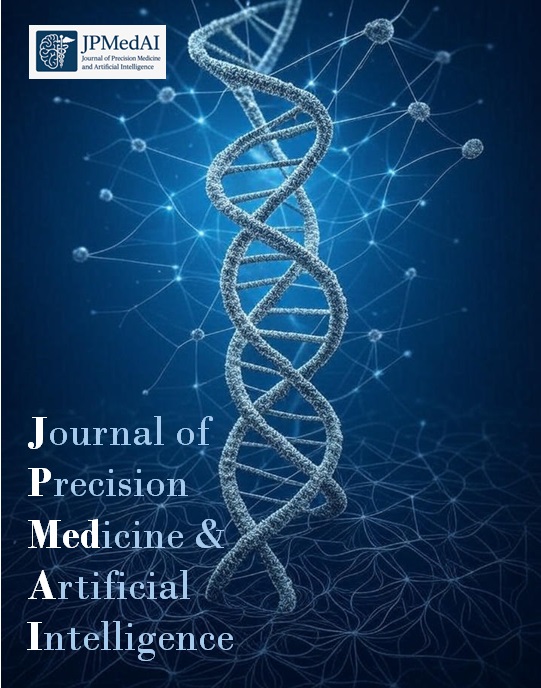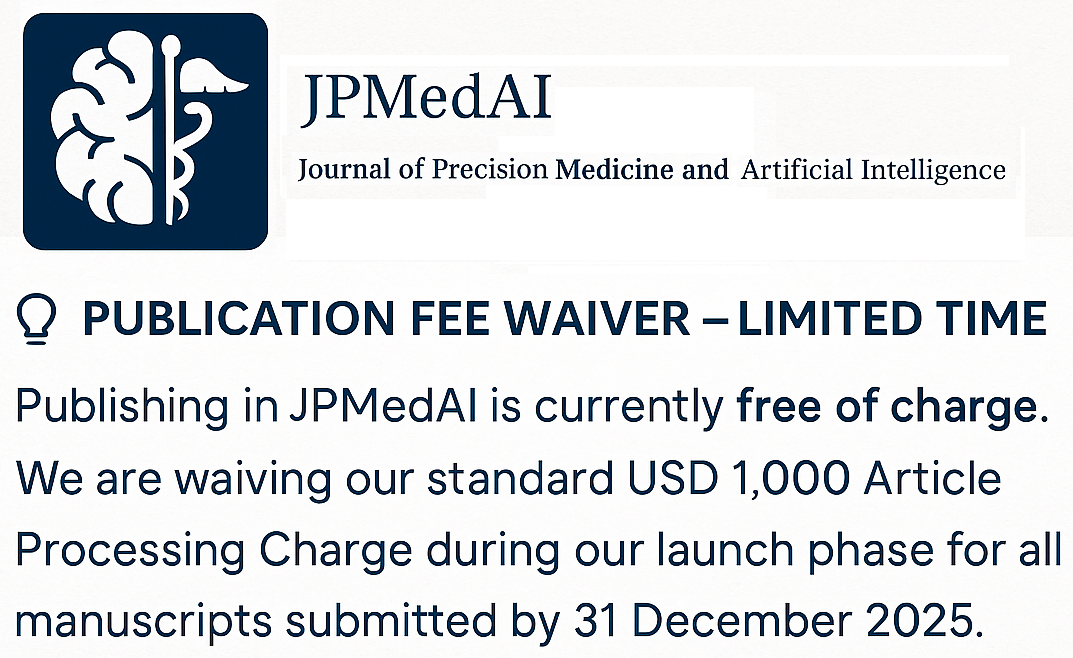
About the Journal
The Journal of Precision Medicine and Artificial Intelligence (JPMedAI) is an international, peer-reviewed, open-access platform dedicated to the application of artificial intelligence in advancing precision medicine.
The journal publishes original research articles, reviews, editorials, technical notes, and commentaries covering:
-
AI in biomedical and clinical medicine
-
Machine learning–based decision support systems
-
Predictive modelling and patient stratification
-
Robotic surgery and automation in medical procedures
-
Drug discovery, development, and repurposing through AI
-
Data mining and advanced analytics for healthcare
-
Integration of AI in laboratory information systems
-
AI for biomarker discovery and genomic interpretation
-
Personalised treatment planning and outcome prediction
-
AI in medical education with precision medicine relevance
The scope emphasises research that connects AI methods with measurable patient-specific factors (e.g., biomarkers, genetics, lifestyle) to enable personalised, high-quality care. JPMedAI encourages interdisciplinary submissions from clinicians, biomedical scientists, data scientists, engineers, and healthcare policy experts.
2. Open Access Policy
JPMedAI operates under a fully open access model, ensuring that all content is freely available to read, download, distribute, and reuse immediately upon publication.
-
Licensing: All articles are published under the Creative Commons Attribution 4.0 International License (CC BY 4.0), allowing unrestricted use with proper attribution.
-
No Subscription Barriers: Readers have immediate, free access to all published material.
-
Article Processing Charges (APCs): [Specify if applicable or if initially waived] to sustain editorial operations and the open access infrastructure.
-
Plan S Compliance: The journal’s licensing, archiving, and immediate open access model are aligned with Plan S requirements.
3. Copyright & Licensing
Authors publishing with JPMedAI retain the copyright to their work but grant the journal an exclusive license to publish, archive, and disseminate the article in all media formats.
-
Authors agree to make their work available under the CC BY 4.0 license.
-
Proper attribution must be given to the original work and source.
-
This policy supports compliance with major open access mandates and indexing requirements.
4. Peer Review Process
JPMedAI uses a double-blind peer review process to ensure impartial and rigorous assessment:
-
Initial Screening – Submissions are checked by the Editorial Office for scope, format, and compliance with ethical standards.
-
Editor Assignment – A Section or Associate Editor is assigned based on expertise.
-
Reviewer Selection – Two or more independent expert reviewers are invited.
-
Review Process – Reviewers assess methodological soundness, originality, clinical relevance, and clarity.
-
Decision – Based on reviewer reports, the editor may accept, request revisions, or reject the manuscript.
-
Revisions & Acceptance – Revised manuscripts are re-evaluated before final acceptance.
Review timelines aim for an initial decision within 4–6 weeks.
5. Authorship Criteria
JPMedAI follows the ICMJE (International Committee of Medical Journal Editors) guidelines:
An author must meet all the following:
-
Substantial contributions to conception/design, data acquisition, or analysis/interpretation
-
Drafting the work or revising it critically for important intellectual content
-
Final approval of the version to be published
-
Agreement to be accountable for all aspects of the work
Corresponding Author responsibilities include ensuring all co-authors meet the criteria and handling all communication with the journal.
6. Ethical Standards
JPMedAI adheres to COPE (Committee on Publication Ethics) guidelines. Authors must:
-
Obtain ethics committee approval for studies involving human participants
-
Secure informed consent where applicable
-
Follow the Declaration of Helsinki for human research
-
For animal research, comply with relevant institutional and national guidelines
-
Disclose funding sources and potential conflicts of interest
The journal will investigate any allegations of misconduct, including plagiarism, data fabrication, or duplicate publication, in line with COPE flowcharts.
7. Plagiarism & Misconduct Policy
All manuscripts are screened using plagiarism detection software before peer review.
Submissions with significant overlap (above acceptable thresholds) will be rejected or sent back for revision. Proven cases of misconduct will result in retraction and possible reporting to the authors’ institutions.
8. Data Sharing & Transparency
Authors are encouraged to deposit data in recognised repositories and provide data availability statements. For clinical trials, registration in a WHO-approved registry is mandatory.
9. Archiving Policy
The journal participates in digital archiving through PKP PN (Public Knowledge Project Preservation Network) and ensures permanent accessibility of published content.


